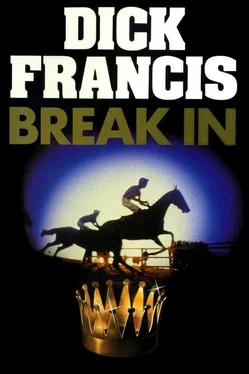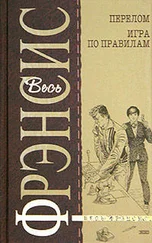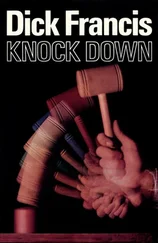‘No, it won’t.’
‘Up to you,’ I said, shrugging.
Bobby and I watched him try to extricate himself without severe loss of face, which could hardly be done. He delivered a few more threats with a good deal of bluster, and then finally, saying ‘Come on, come on’ irritably to his nephew, he stalked away down the drive.
‘Did you immobilise his horsebox?’ Bobby asked.
‘It was a car and a trailer, and the key was in it. I just drove it out of sight round the nearest corner. Wonder if they’ll find it.’
‘I suppose we needn’t have bothered,’ Bobby said. ‘As Graves went to the alarm box first.’
We had thought he might go to his other horse’s box first, find it empty, think he had the wrong place, and perhaps remove one of the horses from either side. We thought he might have brought more men. In the event, he hadn’t done either. But the precaution, all the same, might have been worth it.
We closed the empty stable and Bobby kicked against something on the ground. He bent to pick it up, and held it out for me to see: a large piece of thick felt with pieces of velcro attached. A silencer for a hoof. Fallen out of the carrier, no doubt.
‘Not leather boots,’ Bobby said, grimly. ‘Home-made.’
He switched off the yard lights and we stood for a while near the kitchen door, waiting. We would hear the car and trailer drive off, we thought, in the quiet night. What we heard instead, however, were hesitant footsteps coming back into the yard.
Bobby turned the lights on again, and the boy stood there, blinking and highly embarrassed.
‘Someone’s stolen Uncle’s car,’ he said.
‘What’s your name?’ I asked.
‘Jasper.’
‘Graves?’
He nodded and swallowed. ‘Uncle wants me to ring the police and get a taxi.’
‘If I were you,’ I said, ‘I’d go out of the gate here, turn left, take the first turn to the left along the road a bit, and use the public telephone box you’ll find down there.’
‘Oh,’ he said. ‘All right.’ He looked at us almost beseechingly. ‘It was only supposed to be a lark,’ he said. ‘It’s all gone wrong.’
We gave him no particular comfort, and after a moment he turned and went away again down the drive, his footsteps slowly receding.
‘What do you think?’ Bobby said.
‘I think we should rig the bell so that anyone coming up the drive sets it off.’
‘So do I. And I’ll disconnect it first thing when I get up.’
We began to run a blackened string tightly across the drive at knee level, and heard Graves’s car start up in the distance.
‘He’s found it,’ Bobby said. He smiled. ‘There’s no telephone box down that road, did you know?’
We finished the elementary alarm system and went yawning indoors to sleep for another couple of hours, and I reflected, as I lay down, about the way a feud could start, as with Graves, and continue through centuries, as with Allardecks and Fieldings, and could expand into political and religious persecutions on a national scale, permanently persisting as a habit of mind, a destructive hatred stuck in one groove. I would make a start in my own small corner, I thought sardonically, drifting off, and force my subconscious to love the Allardecks, of which my own sister, God help her, was one.
Persistence raised its ugliest head first thing in the morning.
I answered the telephone when it rang at eight-thirty because Bobby was out exercising his horses and Holly was again feeling sick: and it was the feed-merchant calling in his Etonian accent to say that he had received a further copy of the Daily Flag .
‘I’ve just picked it up,’ he said. ‘It’s today’s paper. Monday. There’s another piece outlined in red.’
‘What does it say?’ I asked, my heart sinking.
‘I think... well... you can come and fetch it, if you like. It’s longer, this time. And there’s a picture of Bobby.’
‘I’ll be there.’
I drove straight round in Holly’s car and found the feed-merchant in his office as before. Silently he handed me the paper, and with growing dismay I looked at the picture which made Bobby seem a grinning fool, and read the damage in Intimate Details.
Money troubles abound for Robertson (Bobby) Allardeck (32), still training a few racehorses in his grandfather’s once-bustling stables in Newmarket. Local traders threaten court action over unpaid bills. Bobby weakly denies the owners of the remaining horses should be worried, although the feed-merchant has stopped deliveries. Where will it end?
Not with manna from heaven from Daddy.
Maynard ‘Moneybags’ Allardeck (50), cross with Bobby for marrying badly, won’t come to the rescue.
Maynard, known to be fishing for a knighthood, gives all his spare cash to charity.
Needy Bobby’s opinion? Unprintable.
Watch this space for more.
‘If Bobby doesn’t sue for libel,’ I said, ‘his father surely will.’
‘Greater the truth, greater the libel,’ the feed-merchant said dryly, and added, ‘Tell Bobby his credit’s good with me again. I’ve been thinking it over. He’s always paid me regularly, even if always late. And I don’t like being manipulated by muck like that.’ He pointed to the paper. ‘So tell Bobby I’ll supply him as before. Tell him to tell his owners.’
I thanked him and went back to Bobby’s house, and read Intimate Details again over a cup of coffee in the kitchen. Then I pensively telephoned the feed-merchant.
‘Did you,’ I said, ‘actually tell anyone that you intended to stop making deliveries to Bobby?’
‘I told Bobby.’ He sounded equally thoughtful. ‘No one else.’
‘Sure?’
‘Positive.’
‘Not even your secretary? Or your family?’
‘I admit that on Friday I was very annoyed and wanted my money immediately, but no one overheard my giving Bobby a talking to about it, I’m quite certain. My secretary doesn’t come in until eleven on Fridays, and as you know, my office is an annexe. I was alone when I telephoned him, I assure you.’
‘Well, thanks,’ I said.
‘The informant must be at Bobby’s end,’ he insisted.
‘Yes. I think you’re right.’
We disconnected and I began to read the Daily Flag from start to finish, which I’d never done before, seeking enlightenment perhaps on what made a newspaper suddenly attack an inoffensive man and aim to destroy him.
The Flag’s overall and constant tone, I found, was of self-righteous spite, its message a sneer, its aftertaste guaranteed to send a reader belligerently out looking for an excuse to take umbrage or to spread ill-will.
Any story that would show someone in a poor light was in Praise was out. The put-down had been developed to a minor art, so that a woman, however prominent or successful, did not ‘say’; instead she ‘trilled’, or she ‘shrilled’, or she ‘wailed’. A man ‘chortled’, or he ‘fumed’, or he ‘squeaked’.
The word ‘anger’ appeared on every single page. All sorts of things were ‘slammed’, but not doors. People were reported as denying things in a way that interpreted ‘deny’ as ‘guilty but won’t own up’; and the word ‘claims’, in the Flag’s view, as, for instance, in ‘He claims he saw...’ was synonymous with ‘He is lying when he says he saw...’
The Flag thought that respect was unnecessary, envy was normal, all motives were sleazy and only dogs were loved; and presumably it was what people wanted to read, as the circulation (said the Flag) was increasing daily.
On the premise that a newspaper ultimately reflected the personality of its owner, as the Towncrier did Lord Vaughnley’s, I thought the proprietor of the Daily Flag to be destructive, calculating, mean-spirited and dangerous. Not a good prospect. It meant one couldn’t with any hope of success appeal to the Flag’s better nature to let up on Bobby, because a better nature it didn’t have.
Читать дальше




